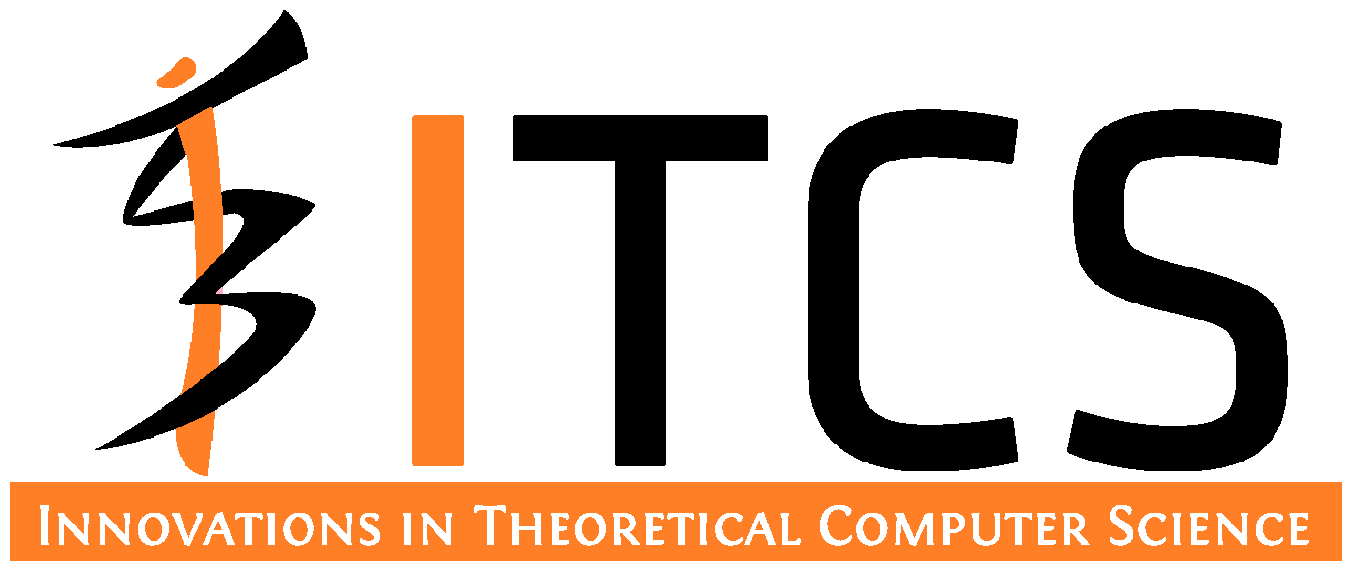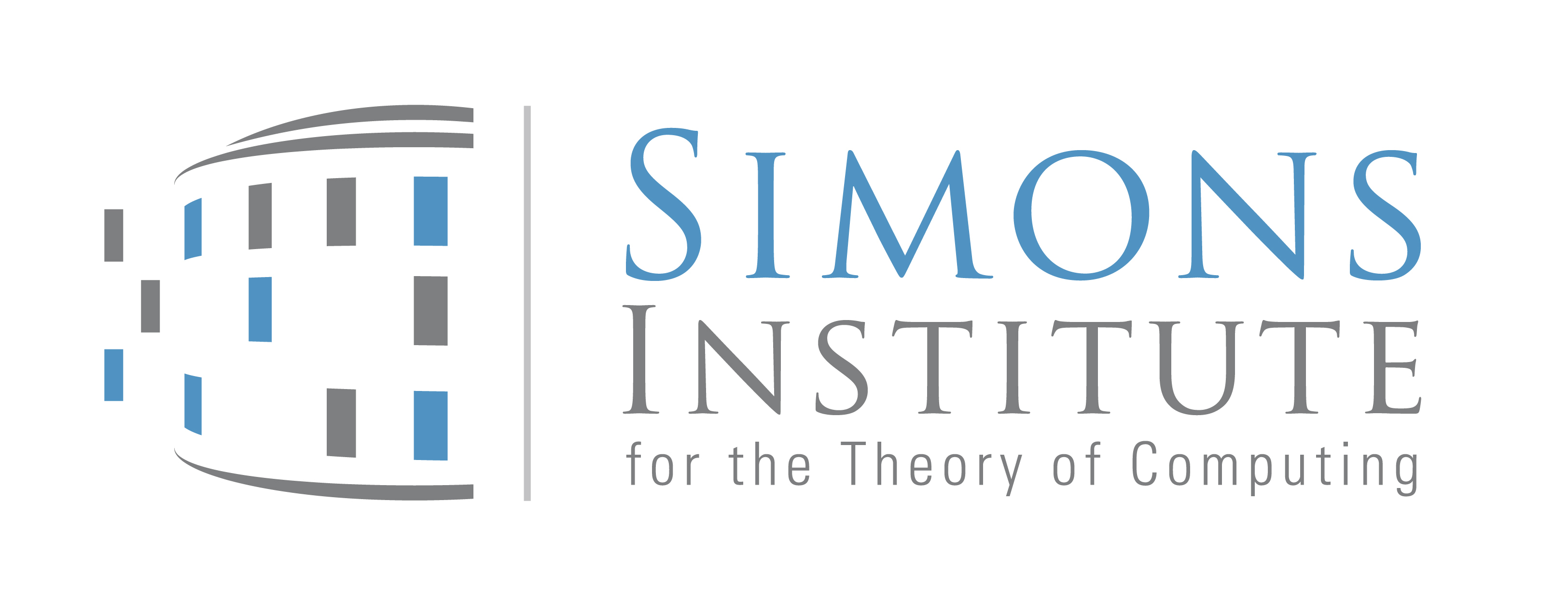

|
Abstract submission deadline: Submission deadline: Notification to authors: Conference dates: |
September 4, 2025 (04:59pm PDT) September 6, 2025 (04:59pm PDT) November 10, 2025 January 27-January 30, 2026 |
|
Josh Alman, Columbia University Amey Bhangale, UC Riverside Arnab Bhattacharyya, University of Warwick Eshan Chattopadhyay, Cornell University Shahar Dobzinski, Weizmann Institute of Science Yuval Filmus, Technion Noah Fleming, Columbia University and Lund University Uma Girish, Columbia University Gramoz Goranci, University of Vienna Tom Gur, University of Cambridge Max Hopkins, Institute for Advanced Study Christian Ikenmeyer, University of Warwick Michael Kapralov, École Polytechnique Fédérale de Lausanne Dakshita Khurana, University of Illinois Urbana-Champaign and NTT Research Pravesh Kothari, Princeton University Michal Koucký, Charles University Jerry Li, University of Washington Yang Liu, Carnegie Mellon University Inbal Livni Navon, Ben-Gurion University of the Negev Shachar Lovett, UC San Diego Noam Mazor, New York University |
Ankur Moitra, Massachusetts Institute of Technology Anand Natarajan, Massachusetts Institute of Technology Ryan O'Donnell, Carnegie Mellon University Debmalya Panigrahi, Duke University Seth Pettie, University of Michigan Nicolas Resch, University of Amsterdam Noga Ron Zewi, University of Haifa Aviad Rubinstein, Stanford University Rahul Santhanam, University of Oxford Shubhangi Saraf, University of Toronto (Chair) C. Seshadhri, UC Santa Cruz Omri Shmueli, NTT Research Shay Solomon, Tel Aviv University Kevin Tian, UT Austin Eliad Tsfadia, Bar-Ilan University Ali Vakilian, Virginia Tech Santhoshini Velusamy, Toyota Technological Institute at Chicago Aravindan Vijayaraghavan, Northwestern University Ilya Volkovich, Boston College David Woodruff, Carnegie Mellon University Henry Yuen, Columbia University |
Authors should register and submit their paper via the hotcrp submission site, by the above strict deadlines.
Formatting. The font size on submissions should be at least 11 point and the paper should be single column. Beyond these, there are no formatting requirements. Authors are required to submit a COI declaration upon submission.
Double-blind reviewing. The conference will employ a lightweight double-blind reviewing process. Submissions should not reveal the identity of the authors in any way. In particular, authors’ names, affiliations, and email addresses should not appear at the beginning or in the body of the submission. (Author and institution information will be uploaded separately on the submission site.) The purpose of this double-blind process is to help PC members and external reviewers come to a judgment about the paper without unconscious bias, and is not intended to make it impossible for them to discover who the authors are. Nothing should be done in the name of anonymity that weakens the submission or makes the job of reviewing the paper more difficult. In particular, important references should not be omitted or anonymized. In addition, authors should feel free to disseminate their ideas or draft versions of their paper as they normally would. For example, authors may (and are in fact encouraged to) post their papers to arXiv/ECCC/IACR etc.
Content. Authors should strive to make their paper accessible not only to experts in their subarea, but also to the theory community at large. The submission should include clear proofs of all central claims. In addition, it is strongly recommended that the paper contain, within the first 10 pages, a concise and clear presentation of the merits of the paper, including a discussion of its significance, innovations, and place within (or outside) of our field's scope and literature. The committee will put a premium on simple and straightforward writing that clearly conveys the results of the paper.
PC submissions. Submissions authored by program committee members (with the exception of the PC chair) are allowed. Utmost care will be taken to avoid COIs with PC submissions and to ensure that the reviews and the discussion remain confidential from the authors. PC submissions will not receive any advantage.
Confidentiality. All submissions will be treated as confidential, and will only be disclosed to the committee and their chosen sub-referees. In addition, the program committee may consult with journal editors and program chairs of other conferences about controversial issues such as parallel submissions.
Results published/presented/submitted at another archival conference will not be considered for ITCS. Simultaneous submission to ITCS and to a journal is allowed. Papers accepted to ITCS should not be submitted to any other archival conferences.
Authors are encouraged to post full versions of their submissions in a freely accessible online repository such as Arxiv, the ECCC, or the Cryptology ePrint archive. It is generally expected that authors of accepted papers will make full versions of their papers, with proofs, available before the conference begins.
Participants near to graduation (on either side) will be given an opportunity to present (in 2-3 minutes) their results, research, plans, personality, and so on during the "Graduating bits" session. This is one of the important traditions of ITCS, and not to be missed! Details on how to participate will be provided closer to the conference date.
The committee may award a "best student paper" award.
ITCS is committed to an inclusive conference experience, respectful of all participants, and free from any discrimination or harassment, including unwelcome advances or propositions of an intimate nature, particularly when coming from a more senior researcher to a less senior one. All ITCS attendees are expected to behave accordingly. If you experience or witness discrimination, harassment or other unethical behavior at the conference, we encourage you to seek advice by contacting SafeToC advocates (http://safetoc.org/index.php/toc-advisors/)
The accepted papers will be published by LIPIcs in the electronic proceedings of the conference. To accommodate the publishing traditions of different fields, authors of accepted papers can ask the PC chair to have only a one page abstract of the paper appear in the proceedings, along with a URL pointing to the PDF of the full paper on an online archive.
